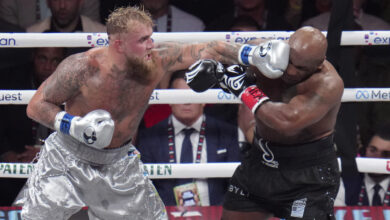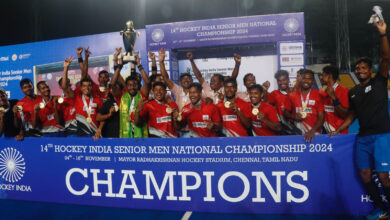Inside the chess backroom: Mums, dads and smart moves | Chess News

Tucked into the belly of Bhasha Bhawan at Kolkata’s National Library — a few feet away from the auditorium where India’s brightest chess talents are jousting with some of the world’s top stars in the Tata Steel Chess India tournament — is the players’ lounge where the tension can get as suffocatingly thick as the playing arena.There is a mandated hush in the auditorium that has been turned into a playing hall for the event, with the silence only punctuated the tap-tap-tap of players slapping their clocks after moves. But at the players’ lounge — a cozy setting, with warm lights and comfortable chairs — some of the parents of India’s top chess players have resorted to their own coping mechanisms to deal with the nail-biting stress that comes with being a chess parent.Being a teenage grandmaster is hard work. But it’s even more so for their parents — those poker-faced sentinels who are ubiquitous at playing arenas while maintaining their dance. Away from the spotlight that shines so brightly on their kids, these parents have some remarkable tales themselves: of their own careers put on hold so they can be full-time chaperones, managers and emotional support systems; of financial hardships endured without a squeak; of risky, life-altering decisions taken; and mostly of trying to find a way to cope with the heightened stress of parenting a chess player.
Those now-viral images of R Praggnanandhaa’s mother Nagalaxmi from the FIDE World Cup in August gave a glimpse of the world behind the curtain. They captured a kaleidoscope of emotions: in one, she beams as she stands next to Praggnanandhaa while he is being interviewed; in another, she’s irritated her son as he turned up 30 seconds late for a game in the tiebreaker against Arjun Erigaisi; in the third, she’s sitting herself at the back of the chess hall wiping away tears with the corner of her saree after her emotions overwhelm her.
As Praggnanandhaa spent one gruelling month in Baku fighting against the best in the world, Nagalakshmi took it upon herself, like she does at all his international tournaments, to ensure the 18-year-old gets his now-routine meal of rice, sambar and vegetables. She travels with cooking apparatus from one country to another. Praggnanandhaa is not the only chess prodigy she has raised, she also does the same for Women’s GM R Vaishali.
“Without my family, I wouldn’t be here,” Praggnanandhaa said earlier this week. “Having my mother at my events has been a very huge support for me. And for my ser as well. She not only takes care of everything for us during tournaments, but also is a source of emotional support. I really cannot express in words how important she is. At Baku during the World Cup, the only thing I had to do was prepare and play chess. It’s very hard to manage yourself at such a long tournament.”
Vidit Gujrathi with father Santosh and mother Nikita at the tournament in Kolkata on Thursday, September 7. (Express photo Partha Paul)
The 18-year-old adds that he prefers to eat Indian food, preferably home-cooked, before games. She may not understand the intricacies on the board, says Praggnanandhaa, but his mother can tell just looking at his face and body language if he has a good position or a bad one on the board.
Just like Nagalakshmi travels with Praggnanandhaa, Gukesh is accompanied his father Dr Rajini Kanth at all international events, Vidit is accompanied his mother Dr Nikita or his ser Vedika, Arjun is accompanied his mother, Divya Deshmukh’s mother Dr Namrata travels with her. It must be noted that parents travelling with young chess players is not a trait unique to Indians — Magnus Carlsen’s dad Henrik has been known to travel with him just like Uzbek GM Nodirbek Abdusattorov’s mother has flown down to Kolkata for the Tata Steel Chess India tournament.
“But it’s more common among Indian parents because Indians are just more emotionally attached to their kids,” says Vidit’s mother Nikita. She says that reading body language is one of the qualities chess parents pick up pretty early along with the unwritten rules of being the parent of a prodigy.
Nikita says that early into Vidit’s chess playing days, she would go to book stalls at the venue and shortl a few books. If Vidit lost, she would just take him there and ask him to pick a book that she could buy him. Now that he has grown up — and cannot be mollified books — the strategy is simple: to give him space.
She chuckles as she remembers the early days of Vidit’s career when she would travel with a rice cooker in the bag. Later, that cooker gave way to the slightly more compact electric cooker. “I would carry readymade food along. If I am not going, I ensure he is carrying food along for the trip,” says Nikita. For the vegetarian Vidit, the food his mother packs saves him a lot trouble when he is travelling, especially to Western countries. “When we went to Russia in 2009 for an open tournament, we took a small cooker along,” says Nikita.
When the children are younger, a parent might need to tell them to focus more — or less — on the sport. But as the ratings goes up, the chess parent learns what to say, and what not to, particularly in the face of defeats. Just like their children intuitively learn pattern recognition on the chequered squares, the parents know when to recognise a particularly bruising defeat. Those are the days to steer clear.
“Chess players need emotional support. They cannot handle defeats. If they lose from a good position, then there will be frustration. What do you do? Keep mum. Len to whatever they have to say. You have to remember you are there for other things. If they fall ill, you take care of them. When they have a big match the next day, you remind them that you will make sure they get up on time, so that they don’t keep waking up in the middle of the night in a state of anxiety,” says Santosh, Vidit’s father.
Learning on the sidelines
For parents, learning happens in the chess halls while their children are occupied on the board inside.
“When my son started, all of this was complete algebra for me. We knew only the basic rules of chess, things like how the pieces move,” says Dr Rajini Kanth, who is the father of India’s top-ranked chess player D Gukesh.
“During events I would be completely free. Nothing to do. Just sitting in the hall for four hours or more. After two years of him playing chess, I started learning little little talking to other parents at tournaments in India. They would tell me what books would be good for middle game and so on. They told me how there are readymade chess calendars available which mapped what tournaments kids can play in through the year if they’re at a certain rating,” says Rajini Kanth.
“If your child is thinking of pursuing chess full-time, you need to know these things. Once children start doing well, you cannot back off and the expenses are going to be 10-fold,” he says. “At the start I thought the expenses would be minimal. As compared to other sports, chess only requires a Rs-150 chess board. But then you start to travel and expenses mount.”
He points out that there are foreign coaches who charge as much as $500 (approximately Rs 41,000) for an hour of training.
Big decisions, bigger sacrifices
Many of India’s chess wunderkinds started their tryst with the sport as a pure hob: in Gukesh’s case, it was so that he had something to do till his father could come pick him up after school; in Praggnanandhaa’s case, it was so that his attention could be steered away from television; in Arjun’s case, it was because he was great at calculation.
But as the children started showing a real appetite for chess, things got serious for the parents.
Gukesh’s parents had to take a battery of life-altering decisions in 2017. “Until then, we would take turns to accompany him in tournaments in India. But then we understood that grandmaster norms (norms are the three criteria any player needs to achieve to get the title of a grandmaster) cannot be achieved playing in India. There were two options: just play in India and wait for the rating to go up slowly. Or to go all out,” recollects Rajini Kanth.
They decided they would go for the latter. That first big decision was followed two more major decisions.
“When Gukesh started playing in events abroad, I had to quit my practice at both my clinics. My wife was in a government job, so we decided she should continue,” he says before adding: “I’m still not sure what I’m doing with my career. But that’s okay.”
That decision meant the family would have only one income to fall back on even as expenses would grow considerably. Rajini Kanth’s calculations, the family spent nearly Rs 50 to 60 lakh in just the 16-month phase between October 2017 and January-February 2019. The family dipped into its savings, and when that started to get thinner, they sold property, and mortaged the the family jewellery.
On the chess circuit, once you become a GM, you get invitations to play in events, which means organisers pay for your accommodation and sometimes even flight costs. But until you get to the top, players have to rely solely on prize money.
“Though we were both doctors, you will only earn if you go to your practice. I was literally jobless. We hadn’t realised that our savings were not good enough even for a year. We had no savings left when he was close to getting his GM title. And you cannot stop then, with him so close to the title. That would be cruel to him. We couldn’t have told our child, ‘I don’t have money.’ We never wanted him to worry about these things. We wanted him to just play,” he says.
The final big decision the family made in 2017 was about Gukesh’s schooling.
“We decided that he would not attend school at all for one year – only play chess. He used to be a topper in his class back then. Initially, we wanted to give him a year to become an international master (the title that’s just below grand master). He became an IM in four months. His school, Vellamal, was very supportive, they allowed him to come just for his exams,” says Rajini Kanth.
What started as a fun hob had suddenly forced the family to make three life-altering decisions in the same year. Rajini Kanth says that everyone in his “typically academically-inclined South Indian family” were doctors or engineers. And while their joint family has a tradition of playing board games like chess and ludo in their spare time, the three decisions caused quite a stir in the family. What made the decisions difficult to justify was that Gukesh back then had a rating of just 2200 and was not even an international master.
Rajini Kanth says the decision earned him and his wife Padma jibes from colleagues and friends too.
“Not attending school was a tough decision. It was really hard. I had to face a lot of flak from my parents and in-laws. People were really upset that not only am I quitting my job but also stopping Gukesh from going to school. People were thinking I had literally gone mad,” he says. “2017 to 2019 was a very, very hard time for us as a family. There would be fights. The only thing that was making us run through it all was Gukesh’s progress.”Most Read
1
Jawan box office collection day 1: Shah Rukh Khan delivers biggest opening in hory of Hindi cinema, blockbuster eyes Rs 150 crore worldwide debut
2
Jawan Movie Review Live and Box Office Updates: Shah Rukh delivers biggest opening in hory of Hindi cinema, Jawan box office day 2 is solid
See More
As remarkable as the careers of some of these young sporting talents are the stories of their parents – of grit, perseverance and incredible amounts of sacrifice.
Dr Jitendra Deshmukh, father of 17-year-old Women’s GM Divya Deshmukh, who is India No 7, however, sees it differently. His wife halted a flourishing practice as a gynaecolog 10 years ago to travel full-time with a young Divya.
“Sacrifice is the wrong word to use. These are your children,” says Jitendra.







